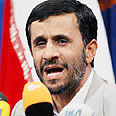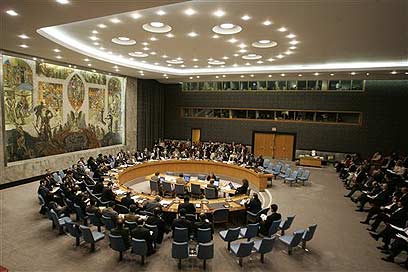
UN tightens sanctions on Iran
UN Security Council agrees on further sanctions aimed at curbing Iran nuclear program; new sanctions target arms exports, state-owned bank and Revolutionary Guards. Iranian FM says Iran will not change nuclear policy
WASHINGTON – The United Nations Security Council unanimously agreed to tighten sanctions against Iran on Saturday, but without the presence of President Mahmoud Ahmadinejad, who had wanted to defend his country's refusal to suspend uranium enrichment.
The package of sanctions, aimed at curbing Iran's nuclear program, targets the country's arms exports, its state-owned Bank Sepah and the elite Revolutionary Guards.
Diplomatic sources in Jerusalem expressed satisfaction at the UN Security Council's resolution. "These sanctions are an appropriate response to the Iranian refusal to honor past resolutions, including Security Council resolution 1737," said sources.
Another diplomatic source said that the resolution was partly a result of Israel's activity around the world.
Diplomatic officials in New York told Ynet that the resolution deals a harsh blow to Iran because it expands the list of boycotted Iranian organizations, and for the first time imposes sanctions on conventional arms deals with Iran.
It also issues a warning to all nations and financial bodies against doing business with Tehran.
Late on Friday, Ahmadinejad cancelled his appearance before the council because visas for his flight crew arrived too late for his private plane to arrive in New York before the vote, his UN ambassador Javad Zarif said. Washington disputes this.
Instead, Foreign Minister Manouchehr Mottaki, who took a commercial flight, addressed the council's suspicions that Iran is developing nuclear weapons under the cover of a civilian atomic energy program.
The 15-nation body unanimously voted for tightening the sanctions.
Iran's foreign minister made proposals to the council that include a previous suggestion Europeans invest in its nuclear industry through a consortium under the control of the International Atomic Energy Agency, the Vienna-based UN nuclear watchdog.

Unanimous vote. UN Security Council
European negotiators had rejected the idea because Iran would control potentially dangerous nuclear fuel production.
The sanctions
The new measures are a follow-up to a resolution adopted on December 23 banning trade in sensitive nuclear materials and ballistic missiles, as well as freezing assets of individuals and institutions associated with atomic programs.
It will impose an embargo on all conventional weapons Iran can sell and freeze the assets abroad of Bank Sepah, as the United States has already done, isolating it from international financing.
The text does not order but calls on nations and international financial institutions to restrict new grants, credits and loans to Iran, which the World Bank or the International Monetary Fund are unlikely to issue.
The resolution also calls for a voluntary travel embargo on Iranian officials and Revolutionary Guard commanders listed in the text and urges restrictions on the import of heavy weapons to Iran.
'Iran will not change nuclear policy'
Iranian Foreign Minister Manouchehr Mottaki responded to the Security Council's resolution, saying that pressure and intimidation will not change Iran's policy.
"Iran does not seek confrontation nor does it want anything beyond its inalienable rights...I can assure you that pressure and intimidation will not change Iranian policy," Mottaki said.
"Suspension is neither an option or a solution," he added, "the Security Council's decision to try to coerce Iran into suspension of its peaceful nuclear program is a gross violation" of the UN charter.
Reuters contributed to the report










